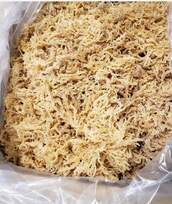 Sea Moss is amongst the worlds top superfoods, arguably the worlds #1 Superfood. Sea Moss has 92 out of the 102 vitamins + minerals your body needs to function wholly. Amongst the most popular ways to intake Sea Moss recently has become in its gel form. Sea Moss in its gel form can be easily mixed and dissolved into tea, soup, grits, baked goods, fruit juices/smoothies, etc. And thats just the beginning of what you can do with Sea Moss. Amongst what is found in sea moss includes: Amino Acids, Vitamins B1, B2, B12, Vitamins A, C, D, E, F, and K. Also, Calcium, Iron, Magnesium, Sulfur, Zinc, Potassium, and much more. Its benefits on the body and overall wellness include: Sustained energy, balanced metabolism, Nourished hair and skin, stronger bones and joints, increased muscle and tissue recovery, aids digestion, rids the body of excess mucus/phlegm, boost thyroid function, boost libido, anti-inflammation, oxygenates cells/anti aging, etc. This is what is known as the “All in One” method to sustainable health and wellness. Growing up with two Caribbean parents I have been taking Sea Moss since a toddler. I recently launched my Tru92 wellness company selling herbal infused sea moss gel bottles to encourage health and wellness within our community. Sea Moss is something that all of is should be adding to our diets immediately. Na’il Salahu-DinA Husband. An Educator. A Healer. and Sociologist. Na’il is a world traveler, having touched every continent except Antarctica. Na’il has been a dedicated student of knowledge for the pass decade under the mentorship of various Imam and Shayukh from New York and Atlanta to Senegal and Sudan. Na’il has been a supporter and facilitator of various cultural and interfaith initiatives specifically focused on holistic health and wellness, youth leadership, communal unity, divine masculinity, and character development according to prophetic tradition. He is currently a 2nd year student at Bayan Islamic Graduate School partnered with the nationally acclaimed Chicago Theological Seminary. Na’il is a community youth leader and an aspiring chaplain. A loving husband and father to his wife Anaya and their two children.
0 Comments
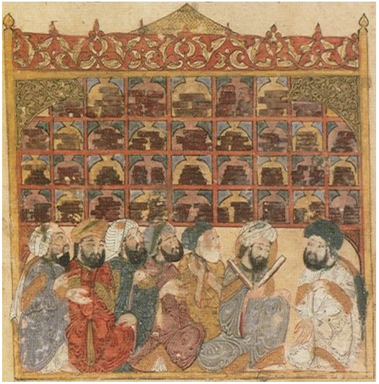 The Roots of Islamic Psychology …..”Ilm al nafs” Why do so many so-called “religious people” see mental illness as incongruous or contrary to faith? This is a question that must be addressed. These assumptions can be rooted in unjustified stigma and ignorance. Mental illness has existed in all times amongst all people. Psychology, the medical and philosophical study of the psych, soul or self, was recorded as early as 1550 BCE when depression was noted in the Ebers Papyrus. One of the earliest noted contributors was a Persian named Muhammad ibn Zakariya al Razi who was a physician, scientist and philosopher. He was noted for writing about mental illness and psychotherapy. His major works called El Mansuri and Al Hawi described many conditions as well as treatment options. He eventually became the first director of a mental health ward in a hospital. The first bimaristans or hospitals were built in Baghdad in the 9th century. Another Persian writer, Abu-Ali al Husayn ibn Abdalah Ibn Sina, more commonly known as Avicenna was a forerunner in the field of psychosomatic medicine. He demonstrated the link between changes in the mental state and changes in the body. Ali ibn Sahl Rabban Al Tabari wrote a work emphasizing the need for psychotherapy. In the 10th century, Ahmed ibn Sahl Al Bakhi stressed the link between spiritual and mental well being. By the 13th century separate wards were made available in the bimaristans for those suffering with mental disorders. These were a few of the pioneers in Islamic psychology that intersected with information of Greek origin within the learning center of Baghdad during the “Golden Age of Islam” from the 8th to the 14th centuries CE. The rest of the world was experiencing what was termed “The Dark Ages” or the “Middle Ages” which began after the decline of the Roman Empire. This was a period of cultural and economic deterioration that occurred in Western Europe. A group of scholars from China, India, Arabia and Ancient Greece exchanging mathematical, astronomical, philosophical, medical information in the learning center of Baghdad. Baghdad, which was centrally located between Europe and Asia, was a major trading spot where ideas were spread for the enhancement of civilization. References 1. Wikipedia contributors, “Timeline of psychology,” In Wikipedia, The Free Encyclopedia, 3 Oct. 2020. Web 2 December 2, 2020 2. Wikipedia contributors, ‘Psychology in medieval Islam’, Wikipedia, The Free Encyclopedia, 26 November 2020. Web 2 December 2020 3. Ayad, Dr. Amira, Healing Body and Soul, 2013, International Islamic Publishing House, Riyadh, Saudi Arabia Ameedah Diaab AbdullahAmeedah has been a mental health consumer for several years and has dedicated her lifework to improving mental health outcomes for others dealing with challenges. She has experience working directly with clients connecting them to services and teaching basic activities of daily living in New Jersey prior to moving to Atlanta. 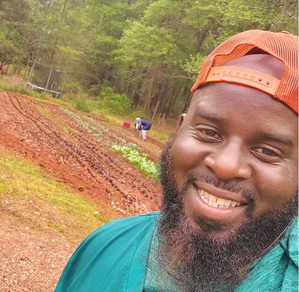 Bread and Butter Farms was officially established in 2013. As a family, we have been growing both collectively as well as on an individual basis throughout our lives. We are both science researchers by trade and at heart, so we treat farming as a science as well. We operate in ways that go against the norm for some people. For example, we plant in a bio-intensive manner which basically means we plant really close together, we make our own chemical-free pest control and offer prepared meals with our produce/meats. It is our passion and we share this with our children by exposing them to the humbling experience of farming. It is important to us to show them that the world of agriculture has many aspects that are not limited to growing. We have a strong respect for the land that we have been blessed to steward. Homeschooling allows us to pass this passion on, educate them in entrepreneurship, and exposes them to the multifaceted options available in the form of value-added products. These are products that you make from produce or animals you have on your farm (i.e. infused oil/vinegar, canning and preserving, goat milk soap, bread from grains, etc.). We offer a variety of products outside of produce available on our website, www.breadandbutterfarms.com. This enables us to provide our customers with a wide range of options and to reduce food waste. At its core Bread and Butter Farms is a family farm that is passionate about education, the environment, and serving our community. Come grow with us! Musa and Micole HasanMusa and Micole Hasan operation Bread and Butter Farms located in Monroe, GA. They run the 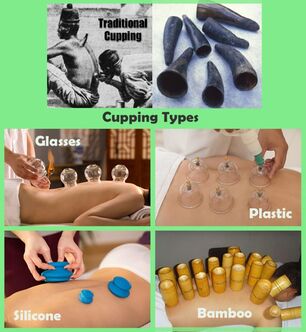 Cupping is an ancient remedy dating back to 1550 BC. The oldest medical book in the world The Ebers Papyrus describes the Egyptians’ use of hijamah (cupping). In China, the earliest description of horn method (using animal horn) was in book Fifty Two Diseases from Han dynasty (202 BC). Over 2000 years, Cupping has been part of Chinese medical practice, among which are acupuncture, Qigong, herbal and dietary therapy. Cupping helps all diseases through balancing Yin Yang and energy flow. From modern medical perspective, cupping increases blood circulation. This relieves muscle tension and promotes tissue repair. Cupping is made of bamboo, glass, ceramic, silicon and plastic. There are two main categories of practice today. Dry cupping is a suction-only method. Wet cupping involves both suction and controlled medicinal bleeding. Recent years, people are enthusiastic about cupping due to famous athletes and celebrities’ engagement. However, like any therapy, it should be careful if you have skin irritation, on blood thinner, pregnant or with some medical conditions. Side effects include dizziness, nausea, skin bruise and blister. Wet cupping leads to hepatitis and HIV if the cups are not sterilized. Please check the practitioner’s training before cupping therapy. Yu Kang, LAc, RD, LD, DipOMYu first began healing studies with her parents, who are well-known doctors of Oriental Medicine in her hometown Zibo -a mid-sized city in northern China. At the age of 15, she was accepted by Shandong University of Traditional Chinese Medicine as one of the youngest students in school history. After eight-year training in Western and Oriental Medicine, she graduated with a doctoral degree of oriental Medicine. Yu then went to China Academy of Traditional Chinese Medicine to be further trained in acupuncture and herbal medicine under the most influential doctors of Oriental Medicine in China. Prior to her arrival in the United States, Yu was a neurologist in Xiyuan Hospital, Beijing. Yu’s extensive training also includes a master’s degree in Nutrition from the Pennsylvania State University, and a one-year dietetic internship at the Beth Israel Deaconess Medical Center-a teaching hospital of Harvard Medical School. Yu is a licensed acupuncturist, a registered dietitian, and a certified herbalist from the National Certification Commission for Acupuncture and Oriental Medicine (NCCAOM). 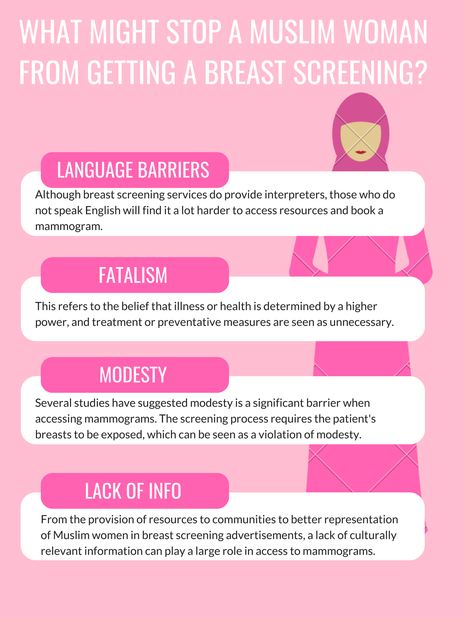 October is Breast Cancer Awareness Month and while most people know about breast cancer, with many showing support by wearing pink ribbons, it's less known that it’s the most common cancer in American women and the second leading cause of cancer death in women globally. Educating ourselves on this disease is an important aspect of breast cancer awareness. According to the American Cancer Society (ACS), the risk of an American woman developing breast cancer sometime in her life is about 12%, or a 1 in 8 chance. Further, the chance that a woman will die from breast cancer is about 2.6%, or a 1 in 38 chance. There are about 230,000 new cases of breast cancer diagnosed in women in the U.S. each year, and about 2,300 new cases diagnosed in men. The following are four key points to educate ourselves on reducing our risk for breast cancer:
Naila Abdul-Hakeem, MPHNaila Abdul-Hakeem, MPH is a Public Health Educator that has a YouTube channel called Accessing Care with Naila where she provides resources and information on ways to access health services without breaking the bank. She lives in Chicago with her husband and six-year-old cat  Its important to recognize that this pandemic has been a trial that Allah has placed on us during this time. As such marriages will be tested. Tests can make a relationship stronger or no longer. The quality of the pre-pandemic relationship can be the determining factor of how a marriage will sustain itself while we shelter in place. The couples who have a healthy loving relationship during normal times will not have any difficulty spending quality time with their mates during these times. Many who marry take the ayat from Allah to heart where he stated "They (your wives) are a clothing (covering) for you and you too are a clothing (covering) for them." (Surah 2, Verse187) I view this ayat from the perspective that clothing serves as a protection for us against the elements, similarly marriage serves as a protection from many psychological, physical, and spiritual elements. We must be protective of one another in normal times, and especially so during this pandemic. We do not know how long the world will be in this present state of pandemia. Just as sickness is a means of expiation of sins we have to view the sickness that has enveloped the planet as a means of purification for the planet. With this in mind we have to practice patience with ourselves and with each other. How does the pandemic impact marriages? If we don’t manage our stress and anger it can cause toxicity to be present in the household. "And one of His signs is that He has created for you, spouses from amongst yourselves so that you might take comfort in them and He has placed between you, love and mercy. In this there is surely evidence (of the truth) for the people who carefully think." (Surah 30, Verse 21) We must work to dwell with our mates as Allah ordained in these ayats. We must work to identify means of maintaining tranquility during these times. Here are some suggestions that make weathering this pandemic bearable, and more pleasant: - Pray and fast, and study together more often. - Daily Communications with your spouse that includes active listening. - Allow the relationship to breathe. Take time for yourself, and spend time together. - Establish an exercise regiment individually or as a couple. (Ex. walks, meditation, working out.) - Date safely( Drive-In or movie night @ home, dining out at restaurants that observe pandemic protocols, board games, etc. Above all remember the five love languages as you interact with each other, and know each other’s love language. ( http://www.5lovelanguages.com). The pandemic can be an opportunity to strengthen your bond with your mate. Use the time that Allah has given us wisely; so that when it is lifted our love cups will be overflowing. “ The Best Of You Are Those Who Are Best To Their Women.” Prophet Muhammad (ﷺ) Imam Nadim Sulaiman Ali, LPC,MAC Nadimali.com 01/05/1442 A.H.- 08/24/2020 C.E. Nadim Ali LPC, MACBorn in Chester, Pa. Married father of 5. Imam of the Community Masjid of Atlanta since 2005. Former convener for the Majlis Ash-Shura of Atlanta. Founding member of MANA(Muslim Alliance Of North America) & current member of the MANA Diwan. Co- Founder of the Da’wah Ensemble Spoken Word Acappella Group. MA in Counseling Psychology, Georgia School Of Professional Psychology. Licensed Professional Counselor(LPC) & Master Addiction Counselor in private practice. 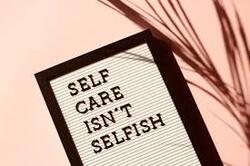 During these past few months, there has been so many different emotions that we have been experiencing. Some of us are experiencing higher levels of anxiety and fear while others may be feeling higher levels of intuitiveness, reflectiveness and mindfulness. Our personal feelings are susceptible to change depending on our individual experiences, spirituality, and outlook on life. As we go through making adjustments in our daily lives whether that is with our jobs, family, social interactions, or simply going into public spaces. It is imperative that we take out moments for our personal self-reflections in order to find balance and take care of our health holistically. One of the ways that we can do this is by implementing a self-care routine into our daily lifestyles. The term has become more popular in the last few years as we find our selves being more conscious of our mental states and understanding more how mental health is a vital key to our wellness. Self-care encourages us to maintain a healthy relationships with ourselves so that you may transmit the good energy to others. Indeed self-care as is far from selfish, but rather self-care is a necessity that allows us to become the best version of ourselves for our well-being and the people around us. Paying attention to our well-being, is necessary for reinvigorating, restoring and rejuvenating ourselves. Everyone around us also benefits from the renewed energy, peacefulness, and joy that we exhibit internally. There are so many ways to engage in self-care routines some in which include meditation, reading a book, stretching, taking a nature walk, or simply soaking in the tub. I personally try to alternate in which self-care techniques that I engage in. Whichever self-care technique that we choose to engage in allow it is be an intentional catalyst for personal healing and reflection. More than ever we have to engage in these positive acts of self-love. Mecca East MPHMecca N. East is the Chief Operating Officer and Executive Director of Salaam Clinic, a free clinic located in Cleveland, OH. She is the Founder and CEO of Imani Wellness Institute. She is also a certified doula and community health advocate and dedicates her time promoting health education and wellness to the community. She recieved her Bachelor's degree in Biology/Pre-Medicine in 2004 from Spelman College in Atlanta, GA. In 2017, she received her Master's degree in Public Health from The George Washington University in D.C. Mecca is committed to uplifting the community in which she serves by improving health outcomes through empowering individuals and families to embrace healthy lifestyles. 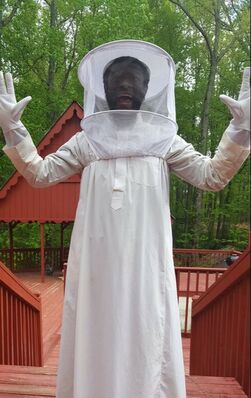 The journey of Tariq, the Muslim beekeeper began approximately three years ago. Tariq has always been a “nature boy” for as long as he could remember. As a young boy, he was the kid that stayed outdoors. His preference would be to ride bikes or play basketball than to play video games. But when friends were not around, he passed time collecting and building vivariums (enclosures, containers, or structures adapted or prepared for keeping animals under seminatural conditions for observation). Tariq first started off building terrariums for collecting and raising toads, lizards, and snakes that he would catch around the house. He then moved to aquariums where he raised various fish, crustaceans, amphibians, and turtles. It should come to no surprise that by his senior year of high school he was well positioned to go to college and major in zoology. However, due to his father cautioning him that a zoologist would not have a financially rewarding life and the school of his choice (Morehouse) didn’t have a zoology major, he chose to major in biology instead. Although he was on a pre-med track, he opted not to pursue medical school after college. Rather his secondary passion for social activism lead him to education. Tariq never strayed far from his nature loving side; in his classrooms he raised praying mantises. Shortly after starting a career as a high school teacher, he was back in the seat of the student obtaining a master’s degree in Science Education. After about 10 years as a teacher, he transitioned into Educational Leadership. Tariq currently acts as director, educator, and wellness therapist at Makkah International Institute. After founding Makkah International Institute and beginning to homestead he has now been afforded the opportunity to rekindle his childhood passion of exploring the natural world. Among other endeavors, Makkah International Institute takes regular expeditions to provide youth with real world, culturally relevant learning experiences. Among these expeditions, we have gone snorkeling, taken college tours, visited nature centers, and various farms including that of a Muslim beekeeper. It was at this trip to visit a Muslim beekeeper in 2014 that he was first introduced to beekeeping. The beekeeper saw the enthusiasm in the faces of the summer camp youth that he decided to invest in the organization by giving the organization a beginner’s beekeeping book. Tariq flipped through it, and three years later, as his homestead was steadily growing, he was ready to buy my first batch of honeybees which he purchased from another Muslim Beekeeper. The honeybees were one of the last animals to join his homestead: after the chickens, quail, and goats. After his first year of beekeeping he attended the Young Harris Beekeeping Institute and became a certified beekeeper. He is currently working on his third beehive, and plans to continue to advance in the art of beekeeping until he becomes a master beekeeper. Tariq aspires to add to the scientific research of bee related matters as well as experience being a honey judge. In addition to the personal fulfillment that beekeeping has given Tariq, children within the community have also benefitted tremendously from him being a beekeeper. Since honeybees are major pollinators, the children have gained a better interest in and understanding of agriculture and food production. Beyond honey, the children have also learned that humans collect many other useful products from bees such as wax, royal jelly, and pollen. We anticipate that we will soon have children expressing interest in going into the natural health field due to learning of the many health benefits of pollen and royal jelly. We already have children that want to make candles and cosmetic products from the wax! The youth have already gained experience in harvesting honey, this year Makkah International Institute is looking forward to producing candles and cosmetics as well! Unlike the keeping of other animals and critters, Tariq finds that beekeeping is highly connected to his religious fulfillment. The bee is mentioned in the Quran and the Prophet said that honey, black seed, and hijama are cures for all diseases and the best of all medicines. As an Islamic wellness therapist not only does Tariq perform hijama, but he also gives wellness advice on a regular basis. So quite naturally, he relays the many narrations of Prophet Muhammad that relate to wellness. If someone is sick, all too often Tariq will recommend that they take some honey. In fact, he even provides it after his hijama appointments. Which is local, fresh from the farm, and above the organic standard! After it is all said and done the number one question people ask is “how many times have you been stung”? Contrary to what most people believe, honeybees are relatively easy to manage. In his three years of beekeeping, he has only been stung about five times. Beekeeping maintenance mainly consists of opening the hive about twice a month to check the health and development of the colony. In my three years I have spent about $700 in beekeeping supplies and training. Which is about the same as a good pedigree German Shephard (without the training!). But unlike a pet dog, the honeybees find their own food. They will travel about a mile away to find the flowers they love. Makkah International Institute combines three essentials to community prosperity: service, education, and wellness. Central to our mission is the honeybee. With aw inspiring social structure and unmatched work ethic the honeybee is so central to our organization that it was chosen as our mascot. The Makkah Institute Killer Bees are steadily growing in popularity at many local basketball tournaments donning their Stealers (and honeybee) black and gold colors. Beyond summer camps and school curricula, Makkah International Institute uses beekeeping in a holistic manner to uplift our community. If anyone has any questions or need advice Tariq is always willing to lend a helping hand to the community. Till the next time, Happy Beekeeping! Tariq Abdul-Malik B.S, MAT, Ed.S, CHP Tariq Abdul-Malik is the founder and director of Makkah International Institute LLC, Makkah Institute Inc., and Makkah Farms. He is a passionate father of 9, husband, son, brother, educator, hijama practicitioner, and beekeeper. He is a staunch advocate for holistic wellness and education that balances mind, body, and spirit. 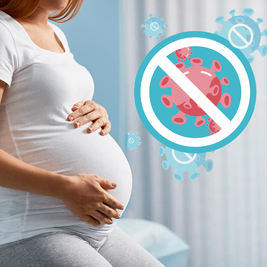 Based on what we know at this time, COVID-19 affects pregnant women no differently than non pregnant women. However, pregnant women in general are at a greater risk of getting sick from respiratory viruses than non pregnant women. Some babies have tested positive shortly after birth, but it is unknown whether the babies got the virus before, during, or after birth. There are few reports of newborns with severe illness; however, much is still unknown about the risk of COVID- 19 to newborns. We do not know if COVID-19 can be spread thru breast milk, but limited data available states that it is highly unlikely. So breastfeeding continues to be the best source of nutrition for all infants. On the day you deliver, if you are positive for COVID-19 or exhibiting symptoms you will be placed on isolation and more than likely separated from your baby at birth. Some hospitals will allow the infant to stay in your room but a 6 feet separation between mom and baby must be maintained. This is for the good of the child. Most hospitals will allow only one support person in the delivery room, and they will not allow that person to swap out with another. If you’re pregnant you should take the following precautions:
Lisa Connor APRN, MS, CNM, LCCELisa Connor earned her Masters of Science in Midwifery from SUNY Downstate in Brooklyn, NY in 2000 launching a career in home and hospital births as a full time CNM. Lisa offers a calm reassuring presence that is a blessing to birthing families while her expertise provides a safe and holistic approach to pregnancy and women’s health. 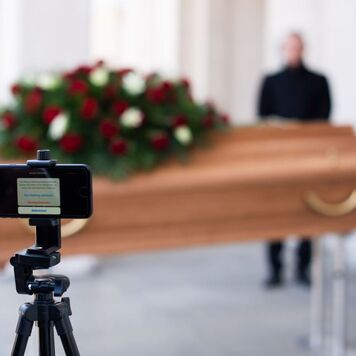 I cannot accept this “New Norm”. I cannot accept that my life will no longer be the same because you told me the boogie man is outside and the boogie man is so big that no one can see him and he is so dangerous that we all have to hide from him, and if you don’t hide from him, shame on you. You are now subjected to social demonization. You are now a pariah because you refuse to accept these boundaries that have been set almost overnight. Shut up and take this check and sit at home and binge watch Netflix. Yes, and your children, set them in front of the computer for eight hours a day. You aren’t qualified to teach your children? But you must. The New Norm is the standard. Your daddy died? Yes. Sorry to hear that, move along please. No, the boogie man did not kill him, but the New Norm protocol is: you are not allowed to grieve with your family, air hugs only, text messages, and tears cried alone in your room while the New Norm flaunts his muscles in the streets. Pushing back any naysayer or independent thinker who challenges the boogie man. The power of the pen is strong. No I haven’t seen anyone die from the boogie man. But I have been flooded with stories on social media, the radio, and newspapers of his destruction. The Boogie Man is bad; he will kill your aging parents. Yes, keep them locked up, do not physically interact with them. The pen wrote that the Boogie man’s victims are being bulldozed into refrigerated trucks and dumped into mass graves. Far be it for me to challenge the Boogie man especially during an election year. I say the Boogie Man can kiss my glass of freshly juiced ginger, lemon, and honey. I will not accept the Boogie Man or the New Norm. You will have to force them on me. They will take advantage of me and fill me with suspicion of my neighbors and friends. He will desensitize my children while over stimulating them. My parents will die a slow lonely death all the while I will be labeled extreme and reckless, because I do not accept the boogie man and I will not abide by the New Norm, because I refuse to live a life in solitude under the guise of being “virtually” socially connected with people who probably wouldn’t call me, hug me, console me even if I was right in front of them. The New Norm will not be my reality. I need you! Reshelle Abdul-MalikReshelle is the editor of A Message from Makkah. She is also the administrator for Makkah International Institute. Reshelle is a masters degreed educator with with over ten years experience teaching domestically and abroad. She is a mother of 9 children, wife, and sister. |
Don't miss another edition of A Message from Makkah. Click the button below to join our mailing list
Contact Us for Advertising Opportunities!
Archives
January 2023
Categories
All
Our Sponsors |
Makkah International Institute
 RSS Feed
RSS Feed